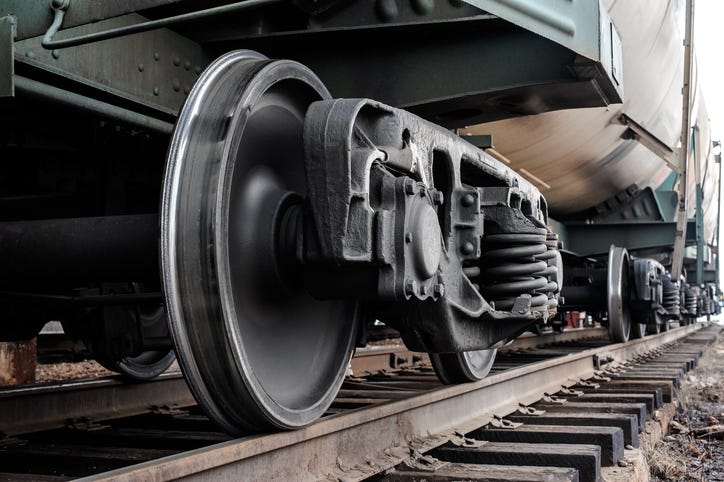
New details are coming to light following a series of derailments involving Norfolk Southern trains in Ohio.
Among the most startling revelations: officials say a specific type of railcar recently put into service has defective, loose wheels.
The issue was discovered during cleanup at the derailment site in Springfield last week. It was the second time in a month a Norfolk Southern train derailed in Ohio -- the first happening in East Palestine, when cars carrying hazardous materials went off the tracks and ignited, leaving a toxic mess behind.
During Norfolk Southern's cleanup of the derailment in Springfield, officials determined that a specific model and series of railcars had loose wheels, which could cause a derailment, the company said in a statement. The wheels were located on a "series of recently acquired cars from a specific manufacturer." The company did not identify the manufacturer or mention how many cars might be involved.
Once they discovered the issue, Norfolk Southern inspected other cars from the manufacturer on its network and found more loose wheels.
"Upon identifying additional cases of unusual wheel movement, we acted swiftly," the company said. "We issued orders to remove these cars from service until their wheelsets could be replaced, and we have taken steps to remove this specific model and series from service until they can be fully inspected."
Norfolk Southern said it alerted the manufacturer and the rest of the railroad industry, as the cars are used by several companies. The National Transportation Safety Board and the Federal Railroad Administration were also notified.
As a result, the Association of American Railroads issued an industry-wide advisory to halt the use of the specific railcars. According to Trains Magazine, the advisory affects about 625 cars manufactured by National Steel Car of Hamilton, Ontario, Canada.
"This is an uncommon defect to see in a wheelset that demanded urgent action," AAR spokeswoman Jessica Kahanek told the magazine. "This is a voluntary, proactive step aimed at ensuring equipment health and integrity."
According to the AAR advisory, which was reviewed by Trains Magazine, the cars in question were built between August 2022 and as recently as this month.
The derailment in Springfield happened March 4, when 28 of the cargo train's 212 cars went off the tracks. About 1,000 nearby residents were told to shelter in place while officials surveyed the damage, but no injuries or risk to public health were reported. The NTSB is still investigating a cause of the derailment, and it's not clear if the loose wheels identified by Norfolk Southern played a role.
The company's announcement about the wheels happened the same day another one of its trains derailed in Alabama and hours before its CEO testified during a Congressional hearing in the Senate. No hazardous materials were being transported and there was no danger to the public, the company said.
Railway safety has been called into question since the derailment in East Palestine on Feb. 3. Fifty of the 149 railcars went off the tracks. Eleven of the derailed cars were carrying hazardous materials that subsequently ignited, fueling fires that damaged an additional 12 non-derailed cars. Five of the cars were carrying including the highly toxic chemical vinyl chloride, some of which was intentionally burned off to avoid a possible explosion. The Environmental Protection Agency is still assessing environmental hazards posed by the incident, including air monitoring, testing of water quality, and remediation.
While an exact cause of the East Palestine derailment remains under investigation, a preliminary report by the NTSB traced the derailment and initial fire to an overheated axle on car that was carrying plastic pellets. The report indicated that crew members tried to slow the train after the overheated wheel bearing set off a "critical audible alarm message," before an automatic emergency brake application initiated and the train came to a stop. The crew saw fire and smoke, and reported a possible derailment to the dispatcher.
Norfolk Southern has since announced a new six-point plan to increase safety.
While testifying before the U.S. Senate Committee on Environment and Public Works on Thursday, Norfolk Southern President and CEO Alan Shaw said the company was "committed to learning from this accident and working with public officials and the industry to make railroads even safer."
"I am deeply sorry for the impact this derailment has had on the people of East Palestine and surrounding communities, and I am determined to make it right," Shaw said. "We will clean the site safely, thoroughly, and with urgency."
Shaw said the company has committed to reimbursements and investments of more than $20 million in total, and has removed more than 2,300 tons of affected soil from the crash site.
"We are making progress in the recovery and know our work is not yet done," Shaw said. "On behalf of the more than 19,700 hard-working employees of Norfolk Southern, I pledge that we won't be finished until we make it right."


